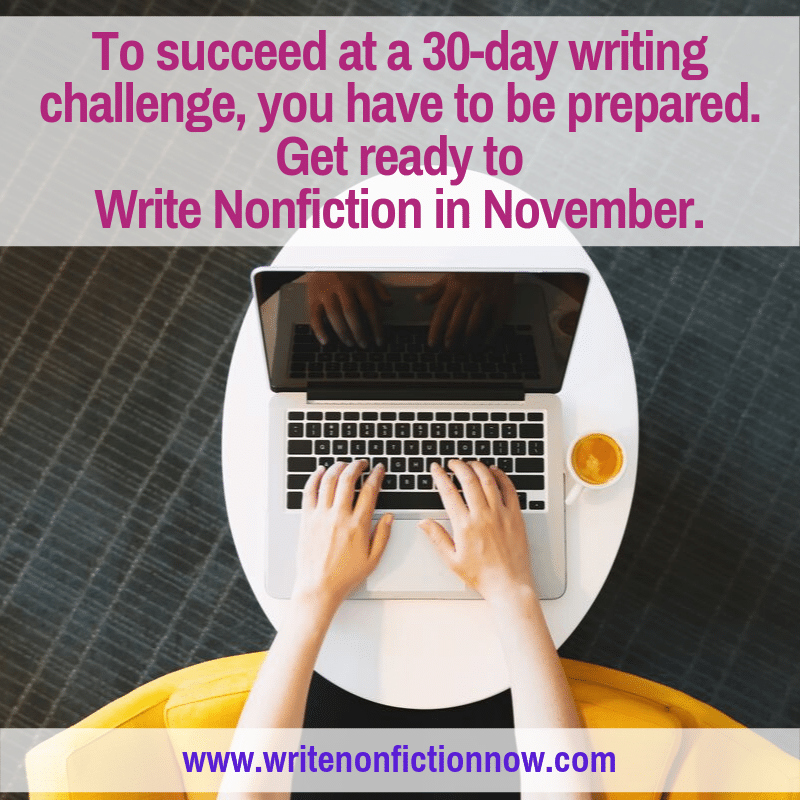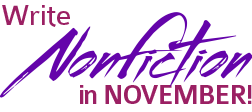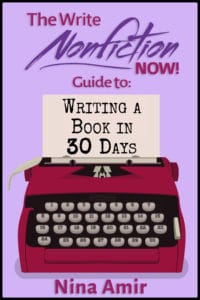 If you’ve ever taken a personal development class or seminar, you know that your transformation beings at the moment you register. It’s as if your commitment—putting money down and scheduling the time on your calendar—starts your unconscious mind working toward self-improvement.
If you’ve ever taken a personal development class or seminar, you know that your transformation beings at the moment you register. It’s as if your commitment—putting money down and scheduling the time on your calendar—starts your unconscious mind working toward self-improvement.
The same is true when you decide to take on a 30-day writing challenge, like the Write Nonfiction in November (WNFIN) Challenge, which is also known as National Nonfiction Writing Month (NaNonFiWriMo). Your mind begins working on your book project as soon as you decide to participate in the writing event. Even when you aren’t writing, you think about your book. You unconsciously mull over problems in structure or content and find solutions. You may even notice sentences and paragraphs mentally getting written long before the book-in-a-month program begins and you put your fingers on the keyboard.
Despite that preparation, if you want to start and finish the first draft of your nonfiction book—or even your novel—in a month, its best to spend time intentionally preparing for the 30-day writing event.
The Importance of Preparation
The most prolific and productive writers of nonfiction and fiction plan out their books and other writing projects in minute detail. For the nonfiction writer, however, it’s essential to have the structure and content of each chapter formulated and all research completed before you write a word.
Additionally, if you want to crush it during the WNFIN Challenge, you need to plan how you will stay focused, energetic, and productive—how you will raise your performance level. You must create a strategy before the event to help you maintain a positive and enthusiastic mindset and productive habits no matter what life throws your way during that 30-day period.
The following checklist will help you prepare for November and your month-long writing challenge. If you would like more help with your preparation, join the 7-Day Ready to Write a Book Challenge that I’ll be hosting on the WNFIN Facebook page starting October 15. (Be sure to “like” the page so you get notified when I go Live!)
How to Prepare to Write a Book in a Month
- Get clear about your goals and project parameters. Before you enter a 30-day writing project, increase your clarity about your project.
-
- Subject—What do you plan to write about?
- Market—For whom are you writing? Who is your ideal reader?
- Benefits—What benefit will readers gain from your book?
- Angle—How will you angle the piece to ensure you target your readers and provide the benefit they desire while also making the piece different from what has already been published on this topic?
- Structure—How will you structure your book? What will be included in the table of contents? What is the logical sequence of chapters or subtopics? How will you break your story into chapters?
- Story—What is the trajectory of the story? What are the turning points? How does the character change from the first to the last chapter?
- Scope—How many words will I have written when I complete the project? How many words do I need to write per day or week to complete the project?
- Determine what research you need to complete before beginning to write. The need for research sidetracks writers. They hit a point in their manuscript where they need information, and they stop writing and begin researching instead. Your two-hour writing period then turns into a research period instead. To prevent this from happening, gather the information you need to complete your book before you begin your 30-day writing challenge.
-
- Commit to write daily, and schedule your writing times on a calendar. Before your month-long writing challenge, block out time on your calendar to write daily. Consider what you need to give up to “find time” to write for more extended periods than usual. Make these writing appointments firm commitments—like a doctor’s appointment you no longer can cancel. Block out enough time to meet your daily or weekly writing quotas. And build in make-up days in case you get behind.
- Clean and organize your space. A cluttered workspace can distract you. If you can’t find what you need in your office or computer, you will waste precious writing time searching for it. Use October to clean your desk, organize supplies and files, and prepare a folder, binder, or file for the manuscript you plan to write in November.
- Protect your focus. To complete the WNFIN Challenge, you must focus your attention—and keep it focused. What distractions might you encounter during? How can you plan now to reduce or eliminate them? The most productive writers have learned to focus their attention in the time they have to write. That’s why they are so prolific.
- Prepare your body and mind. Participating in a 30-day writing event is like running a marathon. Therefore, you must prepare for it similarly. You have to develop physical strength, endurance, and mental clarity. If you don’t do so before and during the WNFIN Challenge, you will limp, rather than run across the finish line—if you make it that far. To avoid that eventuality, plan to:
-
- Sleep enough—Don’t’ skimp on sleep during your 30-day writing challenge. Get enough sleep so your mind and body can work at their full potential. If you sleep less than seven hours per night you are not operating at your maximum level; in fact, you might be impaired.
- Exercise daily—When trying to meet a deadline, most writers drop exercise to make time for writing. Instead, exercise daily to energize your body. This provides the mental clarity you need to write. (Your brain needs oxygen to work correctly and most of us don’t breathe deeply enough.)Exercise also reduces stress and increases hormones that keep you feeling physically strong and mentally and emotionally positive.
- Eat well—What you feed your body makes a huge difference in your ability to write successfully. Like an athlete, you must take your diet into consideration—starting now—to have the energy for your writing marathon. Plan a healthy diet that increases your energy rather than depletes it. You might even plan out meals for November—or cook and freeze them. Don’t forget to replace junk food with healthy snacks—and have them handy. You can even eat “brain food,” but also take supplements.And, drink more water. Your brain needs water to function. You can’t think, create, or write with a dehydrated or unoxygenated brain or a body depleted of necessary nutrients.
- Mindset—Those who finish a book-in-a-month event, have a mindset that supports success. Consider the marathon runner again. This athlete must have a strategy for every point in the race. For instance, at the midpoint, tired muscles set in and it’s easy to begin thinking “I can’t make it to the finish line.”But the runner is prepared for this eventuality. Visualizations completed previously conditioned the runner’s mind to move through the mental and physical exhaustion. The runner also practiced shifting thoughts from “I can’t” to “I can.” The runner has rehearsed changing beliefs from “I’m a loser” or “I never finish” to “I’m a winner” and “I always finish.” And these things help the running cross the finish line.You will have the same type of challenges—similar negative thoughts and beliefs that could stop you in your tracks. Plan ways to maintain a positive, successful, and high-performance mindset.
- Habits—Your current habits have helped you achieve your current level of success—as a writer and in every other area of your life. If you haven’t been writing consistently and you think the WNFIN Challenge is going to help you start a writing habit, you might be surprised when it doesn’t achieve that goal. Why? Your current habits don’t support your desire to write consistently.Develop more supportive habits now…before November. Continue them through November and, by the time the month ends, you will have a writing habit as well.
If you can complete this checklist before November 1, you’ll be ready to meet the challenge no matter which 30-day writing event you choose. (of course, I hope you choose to take the WNFIN Challenge!) Doing so will increase the likelihood that you’ll not only start but also finish your nonfiction or fiction manuscript in 30 days.
How do you prepare for a 30-day writing event? Tell me what you’d add to this checklist in a comment below. And if you found this post helpful, please share it with your friends who write nonfiction.
 This post is part of the 2019 Write Nonfiction in November (WNFIN) Challenge, also known as National Nonfiction Writing Month (NaNonFiWriMo). Find out more about how to participate by clicking here.
This post is part of the 2019 Write Nonfiction in November (WNFIN) Challenge, also known as National Nonfiction Writing Month (NaNonFiWriMo). Find out more about how to participate by clicking here.
The event is sponsored by the Nonfiction Writers’ University. When you become a member of the Nonfiction Writers’ University, you gain access to the WNFIN Prep Program. Get a 30-day trial membership for just $1! (Pay $37/month after 30 days.)

Ardis Mayo says
A great list, Nina. thank you. My one (only 1???) question, at least in this moment, is about the research. I often bump into something after I get started and can’t keep going without checking something I hadn’t expected. I usually leave a line and note to self, but sometimes I can’t keep going until I check my facts.
The one thing I might add to the checklist is a daily practice for ‘grounding’, which could be any spiritual practice according to one’s tradition. For me it includes a candle, breathing meditation, a short reading, and centering prayer first thing in the morning. And whenever I change projects or return from a break, a few centering breaths before I begin. Without this practice I lose focus on all the other steps.
Deborah says
I would add try to enlist those you live with/ interact with/know will be impacted to be supportive or at least tolerant of your 30-day challenge project so you have less outside resistance arising from a failure to communicate the importance of your boundaries and needs during this time.
Nina Amir says
Yes. I agree and often talk about that. And it’s one of the items on the WNFIN Checklist: https://ninaamir.com/WNFINchecklist
Nina Amir says
Hi Ardis! I love the suggestion for grounding. I have a daily ritual when I come into my office that includes candles, intention setting, smudging, and more.
As for research, sometimes you do have to go get the research, but whenever possible, just keep writing and come back. (And set a timer…so you don’t research for more than say 15 minutes.) Mark the spot this way: [RESEARCH]. It’s easy to find with the search function in Word or Scrivener.
Ardis Mayo says
Thanks for the Scrivner tip. I am new at using Scrivner and know about filing research there, but didn’t know about using the word the way you suggest.